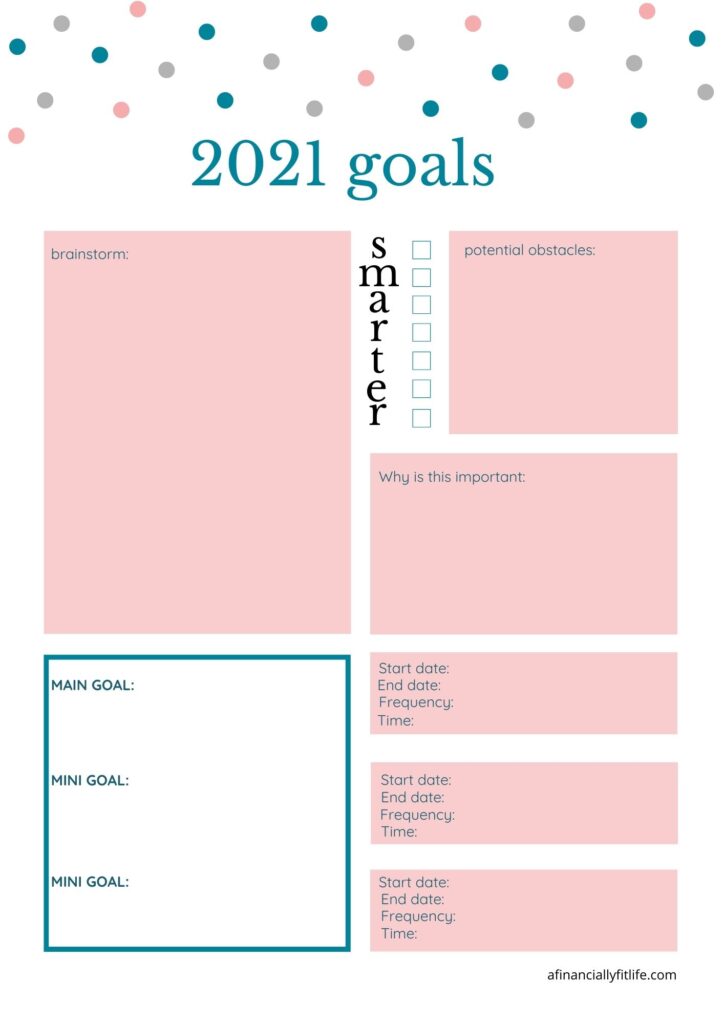How to set effective financial goals in 2021 that are achievable and realistic. Examples, a free printable worksheet, and specific strategies.

Happy new year everyone!
If getting control of your money is something you want this year this post is for you.
Before I explain how to begin making your goals effective and achievable we have to find them.
Here is step one:
Brainstorm some financial goals you may want to achieve this year.
Here I just want you to think about what your goals could possibly be.
Maybe you already know of one, or some.
It is essential that you really put some thought into these.
Think about how you view your finances.
What do you expect your finances to do for you?
If you could live out your ideal financial year what would that look like?
Saving? Investing? Payoff debt? Budget more? Spend less? Increase in net worth? Cash flow something? Make more money? Stop using credit cards? Pay for Christmas in cash?

Look back on this past year and evaluate your financial situation.
Are there things you wish you could have done differently?
All of these are potential money goals.
That does not mean you pick a ton.
I have 3.
If your financial goal is not something you are interested in improving or passionate about you will most likely fail.
I am guilty of this.
Four years ago I started my financial journey with the end goal of owning a home.
I achieved that nearly 18 months ago.
And ever since our financial diligence has faded.
Why?
Because we reached our goal and didn’t set any new ones.
In June we set a goal and bought a car with cash in less than 4 months.
We saved $14,600 in less than 4 months because we set a specific goal.

Without one we have been unintentional with our money, reckless, and more irresponsible.
After brainstorming your goals…
Realize that some more major goals may have a micro or mini-goal attached to them.
If one of your main goals is to pay your bills on time, a secondary goal may be learning how to budget.
Just don’t set too many that you set yourself up for failure.
Your goals must be SMART
If you hear this one more time right?
Don’t stop reading this is important!!!!!!!!!!!!!!!!!!
Unfortunately it is true.
Here me out for a second.
I’m not usually a SMART goal setter but I recently read Your Best Year Ever by Michael Hyatt and he made me a believer.
Not only did he overly explain the reasoning behind your goals being SMART he says they should be SMARTER.
Specific, measurable, actionable, risky, time-keyed, exciting, and relevant.
What the studies show is that the tougher and more specific the goal, the more likely we are to engage our focus, creativity, intellect, and persistence.
Michael Hyatt author of Your Best Year Ever
Here is how Hyatt explains S-M-A-R-T-E-R…
S – It is important that you are clear on what you are looking to accomplish or as well all know it specific. Otherwise known as the What.
Pay off debt, save money, buy a house.
M – Your goals should be measurable otherwise you will have no idea if you actually achieve them.
Goals must be trackable so you know your on the right path.
I can’t just save more money. I need to save $10,000 dollars.

A – Most refer to the “A” as achievable when Hyatt describes the “A” as a need to be actionable.
Actionable in the sense that you will have to take action in order to achieve it.
It is not enough to say make more money but call 2 prospects per day to increase potential revenue by 20%.
R – We also equate the R for Relevant. Hyatt does not. He describes the R as risky.
We will talk about relevance later.
Psychologically goals that are safe just make sense but what what kind of accomplishment are safe goals?
Goals that you would have hit anyway? Probably.
I agree with goals needing to feel somewhat risky.
Risk makes them exciting, it creates more drive and in the end, sometimes it even allows us to accomplish more.
T – Always refers to timing.
It is important that you are time specific otherwise you will have the rest of eternity to finish them.
If you set a goal to be debt-free that’s great but setting a goal to be debt-free in 16 months is even better.
Time can also mean x per week, a specific time during the day, or by a certain date or deadline.
Now for the bonus points by Hyatt
The ER.
E – Is exciting. These are the goals that fire you up!

Getting excited about your goals means that they are personal, important, and relevant to what you want.
Maybe saving for retirement is not exciting for you.
But saving for retirement so you can buy a vacation home in Florida is.
This can be an essential part of your goal setting that an original SMART goal may not have.
R – Is the Relevance.
Hyatt describes relevance as something that is achievable in the current day.
It would be pretty irrational for me to set a financial goal to pay off our house next year.
I could still set a goal to pay of my house.
It would be risky and far-fetched and almost impossible.
But setting that goal even if I don’t achieve it would still produce the result of lowering my mortgage.
Which financially is a win in my book!
Your goals should be of some sort of value to you, coincide with each other, and be realistic for the type of life you are currently living.
Looking to get started on your goals?
Check out my free printable for optimizing your 2021 goals!

What are some examples of effective financial goals?
Track my weekly spending every Sunday at 10pm using Every Dollar.
Invest $1,000 every month into a Roth IRA account to max out our contributions by April 15th.
Pay off $10,000 worth of student loan debt by July 1st.
Complete a no spend month in January by not spending any extra money outside of bills and food for 31 days straight.
So What are my financial goals for 2021?
In order to be as specific as possible our goals are set for only 2021.
Sometimes I find if I get too ahead of myself I can get overwhelmed.
I like the feeling of faster progress so we are really tunneling where we want our money to go this year.
- Get emergency Fund to $50,000 by sending any extra money at the end of the month to savings complete by April 1st.
- Invest at least $500 per month into a Roth IRA account per month.
- Create a sinking fund for future house projects with available income at the end of each month AFTER the emergency fund and retirement contribution is made
After the year we have just had getting our emergency fund to $50,000 is very important to us.
I want contributing to our retirement to be a new line item in our budget. I don’t want to wait until I’m 65 to retire.
We still have some house projects that we are super excited about. 3 major ones that will cost a little bit more money that we would like to save for.
What are your financial goals for 2021?
Interested in reading more?
What to know before starting your debt-free journey
Tips on how to budget for Christmas
Pin for later
